During our unusually long wait in Hodder & Stoughton’s reception, Marcus Sedgwick and I could have covered everything I wanted to know before the interview even started. But we talked about roller coasters and other unstable stuff, just so I could save the rest for the official chat. Besides, I wanted to be more grounded, and not sit with my back to the 16th floor window, and arghh…
I knew it wasn’t going to be the most original way to start an interview, but I had to ask. Better get it over and done with, so we could concentrate on other, more ‘real’ things, afterwards.
‘So, is this finally a ‘real’ book, as opposed to a children’s book?’
Marcus laughs, ‘Let me put it this way, I spoke of this at the event last night, and I managed to answer that question in about 45 minutes, so…’
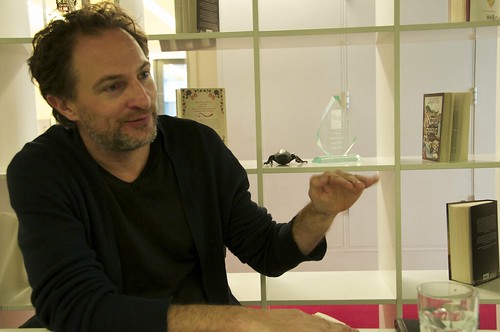
‘Ah.’
‘To give you the short answer, no.’
‘No?’
‘No,’ he laughs, ‘it’s no more or less real than anything else.’
‘You mean you’ve not sort of finally arrived?’
‘No, no, but I am aware that it’s how other people perceive it. The strange thing is I’m starting again where I was 15 years ago, when I wrote my first book. And I’ve already come across that attitude several times, so it wasn’t until someone said “so why have you written an adult book?” and before I could even reply, someone said “because he’s grown up.”’
‘Yes.’
‘So no, it’s not how I see it, at all. It depends what you are talking about, also. If you are talking about books for younger children, or teenagers. Or adults.’
‘Your YA books are really very close to this [new book] in a way.’
‘Some of it, yeah.’
‘What made you think of something so different?’
‘The way to put that initial question is that very often as a writer you don’t decide what to write; something in your head decides the situation for you. Once you’ve had an idea, it’s your job to follow that idea down the logical path and do the story that’s waiting inside that seed of an idea, and because I knew that it was going to go into territory that no children’s publisher would take even as a YA book, I knew if there was going to be anything, it was going to be, for want of a better word, an adult novel.’
‘It struck me that there’s not necessarily all that much difference, except there’s perhaps a bit more hope at the end of a younger book.’
Marcus laughs, ‘I could probably give many examples that are very bleak, in YA.’
‘Something a little bit positive towards the end?’
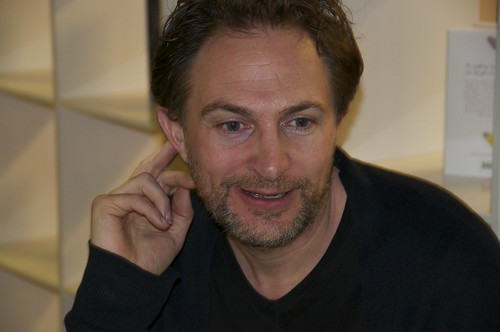
He sounds unconvinced, ‘Well I guess so. I wouldn’t say it’s a horror novel. A thriller maybe, with elements of horror. I Am Legend, say, has got a very bleak and downbeat ending, but I don’t see that as the difference. And there are adult novels that have endings that are upbeat, so…’
‘I see you are going to do another adult novel. Does that come before any of your other books?’
‘No, I’ve got a YA in October, with Orion again. I call it a YA novel. It’s only YA because it will be on the the Orion imprint. To me it’s a book in many ways more complicated than A Love Like Blood, but maybe thematically it doesn’t go into the same darkness that this one does.’
‘Is the second adult book going to be similarly bleak?’
‘Erm, I don’t know. I think it’s going to be more of a mystery, actually. I can’t say too much about it. Ideas are forming in my head. But it’s nothing to do with this, nothing’s supernatural, or historical. Again it’s set in Paris at the turn of the 19th and 20th century, but more of a mystery.’
‘Yes, would you even call this crime?’
‘I’d put it in the thriller category. The Mulholland imprint is quite broad. The way Ruth [his editor] defines it, “if you can call it suspense fiction, then we’ll publish it.” He laughs. ‘So I buy that.’
‘I noticed that you list this book along with all your other books on your website. You’re not worried that you’re going to find a younger fan…’
‘Picking it up?’
‘Yes.’
He laughs. ‘They may do. It’s entirely out of my hands. I could think of having separate websites but it would feel a bit artificial in some way. I haven’t given it a lot of thought, to be honest. I think some teenage readers are more open minded than some adult readers. Obviously that’s a huge generalisation, but…’
‘Yes, where I suffered from shock [in A Love Like Blood] maybe a younger reader wouldn’t, but just take it in their stride.’
‘I think younger readers are pretty good at self-censoring things, and if you think about the difference between a book and a film; a film puts all images in your head, but with a book you create images. You can only create the images that you yourself are capable of imagining. Adults can see more or emote, make connections, that a younger person might not be ready to do.’
‘Yes. Was it difficult to make your book sound so old-fashioned?’
‘No..,’ he laughs, ‘I think that’s just me, and because it’s first person narrative and because I could see him very clearly in my head, that was actually one of the easier elements in the book. Occasionally you need to check your vocabulary; is that word too modern? It’s surprising some of the words you think might be modern and you look it up and you find they’re 300 years old. If it sounds too modern it might create a problem for the readers, so you’re just a little careful. But it was relatively easy.’

‘If I’d come to this without knowing I could easily have put it mid-century.’
‘I’m pleased to hear that. A lot of people are saying it’s got a kind of classic old-fashioned feel to it. That was kind of what I was going for.’
‘Yeah, it had such a nice feel to it throughout, apart from all the blood.’
‘It’s not everyone’s cup of tea.’
‘Why the fascination with horror?’
‘I don’t think I am obsessed with horror. It’s one of the areas I like to work in. It’s very good fun. It sounds weird to say, but you can really let yourself go. What a writer often does is exaggerate something.’
‘Yeah.’
‘You take something that happens to all of us, but you exaggerate tenfold, and so if you’re writing something like this, it pushes you into dark places, and I think that’s why they appeal. Because it is appealing to deep seated fears for me.’
‘Because of your reputation for being into horror, while reading She Is Not Invisible I kept worrying throughout, thinking this seems very nice…’
Marcus laughs.
‘But would you.., all of a sudden?’
‘Yeah, yeah,’ he sounds very pleased, ‘no, no, not at all. It’s my happy book.’
‘Yes, but your reputation gets in the way, because I couldn’t relax.’
‘It’s really different, and I knew it was, and a couple of people said if it hadn’t got my name on the front you would never have guessed it was me. And that was good because that’s what I was trying to do, to show that I can do other things. But that is my happy book. Number 13. Now it’s back to gloomy for another 12 or 13.’
 ‘Are you the father in the book?’
‘Are you the father in the book?’
‘No, but… given that I decided… I was really cautious about whether it was a good idea to write about a writer. I often think writers write about writers when they get stuck for ideas but in the end I thought “no, it does have to be for various reasons,” and he’s not me, but you can’t write about writers without using your experience.’
‘Yeah. I thought even the wanting to change to a new genre…’
‘Yeah yeah. That was just my joke because I was doing it the other way round.’
‘Yeah.’
‘I’d been writing miserable books and I thought I’d write a happy one and and I was remembering what happened to Woody Allen; whatever he does people say “well, I preferred you when you did…”’
‘You can never please some people.’
‘No.’
‘I hadn’t realised before that She Is Not Invisible was being published in more accessible formats. Which ones?’
‘Very few books end up as Braille, and only about 18-20% read Braille anyway. Mostly they are using things like Daisy readers, which is a fancy ebook, which has bookmarking skills and chapter prompts and things like that, and a few others, large print, giant print. Most blind people read audio, and don’t draw any distinction. Even an audiobook is going to be six months. We were able to make sure they were available on publication day. For She Is Not Invisible we had a standard book, an ebook, giant print and large print, Braille and Daisy reader.’
‘Do you know how they sold?’
‘I don’t know how the accessible editions have done. I’ve had some sales figures on the hardback, and I would guess things are probably proportionate. Of all books only 7% make it into some kind of accessible format, and that’s adding together all of those formats, which is pretty sad, really.’
‘For children who want to do what everyone else is doing, it’s very sad.’
‘I do the Carnegie shadowing every year, and they try and get those into Braille. The extraordinary thing is to see Braille, because even a modest book will be like four or five volumes.’
‘I was amazed at that clip you had on your website of the actress, reading Braille and recording at the same time. It was fantastic.’
‘Apparently that’s a very rare skill to have.’
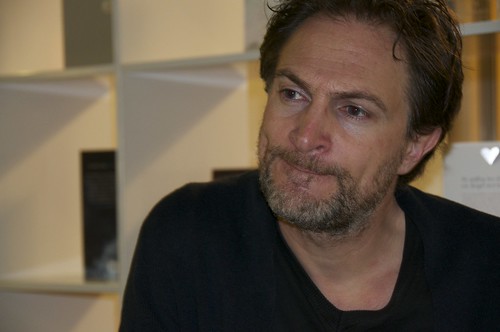
‘Now, I want to know why Sweden and Swedish?’
He laughs. ‘I don’t know. I haven’t been for years now, because my life went in a different direction, but I think it was a combination of things growing up. My dad ran some adult education schools in Kent and he had some links to the Folkuniversitet in Gothenburg. We never went there, but we had lots of their books. And then silly things like ABBA and Saab and that whole notion of Sweden; cool design, and my parents had been to Sweden in the late fifties and were always full of stories about it, how advanced certain things were and everything. Then I thought I had this thing about Sweden, but why didn’t I just go there and find out if I’d like it? So I went ten years ago and absolutely loved it. I came back here and started learning at UCL evening classes, and then started going two or three times a year. But we are in France now and I do miss Sweden. I think my Swedish is deteriorating; you know, from get-by-able to extra crippled.’
‘I was going to ask, how good are you, or were you?’
‘At one point it was pretty good, and I remember one of the last days I spent out on Brännö, I went to a party and chatted to some guy for half an hour without any problem to understand it. But it goes so quickly. Because you haven’t learned it young, it doesn’t stay with you so easily.’
‘You need to use it or it disappears. So, France. The French Alps, is it? It sounds very fancy.’
‘It’s not as fancy as it sounds, it’s quite a rustic chalet we have, but it is really, really beautiful. It’s not like in a ski resort, it’s on a road up to one, so we’re kind of isolated, but on the main road, so we don’t feel cut off. They always snow plough past our house. It’s just so beautiful, the mountain landscape.’
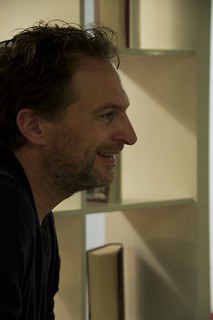 ‘Does this mean that you’re rich?’
‘Does this mean that you’re rich?’
‘Oh, no no no.’
‘I was thinking Cambridge. France.’
‘No, the reason is, I met my partner in Switzerland four years ago and this was the place she bought when she left. So we have one house each…’
‘I was quite impressed when you said about your Cambridge house that you had to buy it because it had the right shed.’
‘Yeah, but my entire house in Cambridge would fit in this lobby. It’s very small. I’m not kidding. It’s a tiny, tiny cottage, but I love it, and I bought it because of the shed in the garden.’
‘You’re working with Thomas Taylor now?’
‘Yes.’
‘On a comic book?’
‘Mm.’
‘Why?’
‘Because I grew up reading comics amongst many other things, and my brother and I did our first graphic novel, which came out at the end of last year. Thomas and I are old friends, and we used to go on holiday every year, and we’d always joked about doing a story together, and he was looking for something new to do with his illustrations. He’s been writing too, but he was looking to find a way of making his illustrations a bit older and cooler and faster to do, and I was looking for a new fun project.’
‘Mm.’
‘So it’s gothic Tintin, basically. I’ve done the first draft of the text and waiting for the edits to come back from the States, and then he’s got about twelve months for drawing.’ Marcus laughs. ‘He has the harder job.’
‘Yes, that must take an awfully long time.’
‘He’ll be at the party later tonight.’
‘I met Thomas at the Stockport awards. So, your friendship came first, and you just decided to do something with it.’
‘Yeah.’
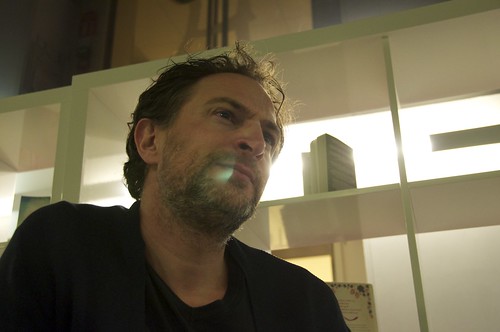
‘Is that the same as with your brother?’
‘No, that’s very different, much younger, I would say more kind of middle grade in American terminology.’
‘What’s it like working with your brother?’
‘Very easy, actually. I think the only thing bad thing about working together – because we get on very well, and we manage to come up with systems that work smoothly – when we finished the book I never felt like I lived in the book in my mental space. It didn’t inhabit me – whichever way you look at it – in the same way as when you write a book by yourself. That was a little bit of a surprise, actually, and that’s the only disappointing thing. Otherwise it made life easier,’ he laughs, ‘quite a relief to have someone to run things by.’
Nice to hear of brotherly love and people getting on. They will apparently work on another book. I just hope they both fit in the shed.
Marcus has to run. He has wine bottles on his mind, and a launch party to whip into shape. Although he could sympathise with my need to go looking for semlor while it was still officially Lent. And he misses Garbo. The restaurant. Not the actress.
(Photos Helen Giles)

Pingback: Marcus Sedgwick on horror and sheds | Bookwitch
Pingback: Marcus and the ‘maneater’ jellyfish | The Occasional Bookwitch